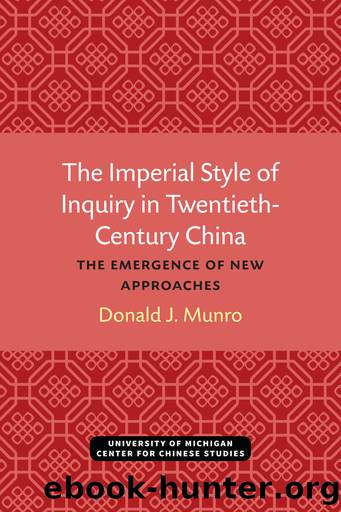The Imperial Style of Inquiry in Twentieth-Century China by Donald J. Munro

Author:Donald J. Munro
Language: eng
Format: epub
Publisher: Kenneth G. Lieberthal and Richard H. Rogel Center for Chinese Studies
Published: 2020-02-15T00:00:00+00:00
CHAPTER FOUR
The Emergence of Objectivity in Modern Chinese Inquiry
The movements I am about to describe have their roots in the activities of two different groups of Chinese in the 1930s and 1940s. One was made up of liberal educators who held the model of Western science in great esteem, though they themselves were not scientists. The other included the second generation of Chinese scientists working in China. Though shying away from political involvement, these scientists helped to create an awareness in the urban areas of objective inquiry, that is, inquiry not directed by political values. They did so through the example of their own research and the impact it made on the institutions in which they worked. Much of their story which I will summarize below has been documented in the studies of D.W.Y. Kwok and James Reardon-Anderson.
Precursors to Change
The liberal educators calling for changes included Cai Yuanpei, an aesthetician and former president of Peking University; Jiang Menglin, an educator; the historians Jiang Tingfu and Fu Sinian; and the philosopher Hu Shi.1 Their shared stance repudiated the realm of immaterial spirit, prized the scientific method as the source of all truth, accepted the deterministic and predictable relations of physical cause and effect, and affirmed confidence in progress to a Utopian future.2
Their primary contribution toward establishing a new style of inquiry was to promote an ideal. That ideal entailed the pursuit of research and education free from political or religious control by authorities outside the laboratory or the academy. They held that the aim of study is the development of the individual, and this can only occur when external authorities do not intrude on or constrain the process of inquiry.3
These liberal educators and advocates of individual development were pitted against the Kuomintang right wing, which was invested in the doctrines of such figures as the philosopher Zhang Junmai and Chen Lifu. This faction implemented the principles described in chapter 2, namely, that all activity must go forward under the guidance of moral or political values. This means that scientific inquiry, which deals with the material world, must be guided by a Chinese spirit of ethics.4 One can assume that âethical spiritâ referred to the Three Peopleâs Principles as defined by the KMT leadership. Among other things, this meant promoting the âpeopleâs livelihoodâ through applied science. This program half succeeded. The Ministry of Education in Nanking did arrange to shift resources to the fields that met its standard of addressing what the government determined to be the practical needs of the Chinese people. This meant transferring money to courses in agriculture, industry, medicine, and commerce; it also meant taking money away from other fields. However, the development of the individual did not figure in any statements of KMT goals. To understand why the powerful conservatives were only half successful, we must turn to that other group that helped lay the foundation for a change in the practice of inquiry, the Chinese scientists.
By the mid 1930s, Chinese scientists were becoming well established in their institutions.
Download
This site does not store any files on its server. We only index and link to content provided by other sites. Please contact the content providers to delete copyright contents if any and email us, we'll remove relevant links or contents immediately.
| Africa | Americas |
| Arctic & Antarctica | Asia |
| Australia & Oceania | Europe |
| Middle East | Russia |
| United States | World |
| Ancient Civilizations | Military |
| Historical Study & Educational Resources |
Magic and Divination in Early Islam by Emilie Savage-Smith;(1534)
Papillon by Henry Charrière(1442)
Bohemians, Bootleggers, Flappers, and Swells: The Best of Early Vanity Fair by Bohemians Bootleggers Flappers & Swells- The Best of Early Vanity Fair (epub)(1419)
Ambition and Desire: The Dangerous Life of Josephine Bonaparte by Kate Williams(1394)
Twelve Caesars by Mary Beard(1324)
What Really Happened: The Death of Hitler by Robert J. Hutchinson(1167)
Operation Vengeance: The Astonishing Aerial Ambush That Changed World War II by Dan Hampton(1164)
London in the Twentieth Century by Jerry White(1149)
The Japanese by Christopher Harding(1135)
Time of the Magicians by Wolfram Eilenberger(1131)
Twilight of the Gods by Ian W. Toll(1123)
Lenin: A Biography by Robert Service(1080)
The Devil You Know by Charles M. Blow(1029)
A Social History of the Media by Peter Burke & Peter Burke(985)
Freemasons for Dummies by Hodapp Christopher;(966)
Napolean Hill Collection by Napoleon Hill(949)
Henry III by David Carpenter;(924)
The Rise and Triumph of the Modern Self by Unknown(923)
Richard III (The English Monarchs Series) by Charles Ross(913)
